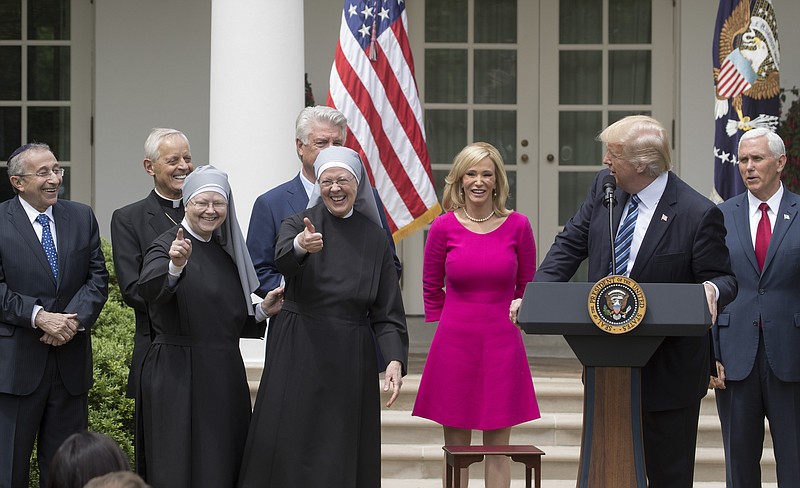"Tolerance is the cornerstone of peace," President Donald Trump said on Thursday as he signed an executive order on "Promoting Free Speech and Religious Liberty."
The scene seemed a bit incongruous.
Donald Trump talking about tolerance?
But it was, after all, National Day of Prayer. And Trump, perhaps more than seeing the light, was pandering largely to the religious right.
The order, for the most part, eases restrictions - or at least discourages enforcement - of a law known as the Johnson Amendment which bars all tax-exempt churches and charities from participating in political campaigns.
The law was and is intended to help keep our country in step with the First Amendment of our Constitution - freedom of religion and freedom from our government imposing a religion - along with Thomas Jefferson's supporting policy that we maintain a wall of separation between church and state.
Those two doctrines together mean that the government cannot make laws that favor one religion over any other, because it cannot make laws related to the establishment of a religion or the free expression of religious beliefs.
In other words, you and I and our children can pray in school, but public schools cannot require us to pray. And the government cannot endorse any particular religion - which is why there should be no copies of the Ten Commandments in front of schools or courthouses, nor any Buddha statues (or nativity scenes) in front of City Hall.
But Trump's order - though considerably watered down from the anti-LGBT version that was initially expected - still raises red flags.
It opens church doors to invite more dark money into politics.
An early and leaked draft of the order focused largely on providing legal cover to government workers, hospitals, nonprofits and private businesses that discriminate against LGBT people and women who use contraception or have abortions. The final version was nothing of the sort. It included no attacks on LGBT lifestyle and abortion was not mentioned. It does, however, tell federal officials to consider changing health care regulations to stop insurance coverage of contraception.
Trump's order, in and of itself, doesn't change the law, though he has previously promised "to get rid of and totally destroy" the Johnson Amendment. Only Congress can do that, but according to The Hill, that also may be a possibility as the idea did gain traction this week in the halls of the Capitol.
The Johnson Amendment and its prohibition of charities, universities and churches participating in politics was proposed by then-Sen. Lyndon B. Johnson, passed without controversy in 1954 by a Republican Congress, signed by a Republican president, and has been supported and strengthened for decades on a bipartisan basis by administrations of both political parties.
Specifically, Trump's order says the IRS shouldn't get involved when church leaders speak on "moral or political issues."
Seriously? Did you ever hear anyone in federal authority tell Franklin Graham, evangelist son of Billy Graham, to stand down when he publicly endorsed Trump? The New York Times reports that only one church is known to have ever lost its tax-exempt status for partisan politicking, and that was in 1995, said Rob Boston, director of communications at Americans United for Separation of Church and State. The Church at Pierce Creek in Conklin, N.Y., lost its tax-exempt status after warning Christians against voting for Bill Clinton for president in 1992.
At the order signing, Trump continued: "We will not allow people of faith to be targeted, bullied or silenced anymore. And we will never, ever stand for religious discrimination. Never, ever."
Really? Muslims, too?
Incredulousness aside, all U.S. churches have been tax exempt for more than 200 years. As are church parsonages.
We all know that dark money loves nothing more than a good tax exemption like the 501(c)(4)s of charities - and apparently now churches - to hide behind.
Well, here's our suggestion: If churches are so hot to wade into politics, strip them completely of their tax exemptions.
Think of the boon we'd suddenly have to the treasury. A 2012 University of Tampa study estimated the yearly cost of taxpayer religious subsidies - er, church tax exemptions - at $71 billion. That would pay for a lot of health care, huh?
We suspect that if churches and clergy are given a choice of whether they can run political campaigns or stay on the public dole of tax exemption, the issue would resolve itself pretty quickly.
